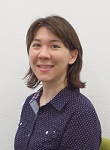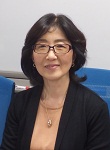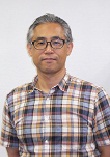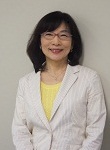講師インタビュー
インタビューVol.5
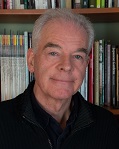
Stephen Mansfield 先生
英国出身のフォトジャーナリスト、ライター、世界各国を取材している。国際研修室では「ニュース英語」「ライティングスキル」「Advanced Communication Skills」を担当。
 「ニュース英語」「ライティングスキル」「Advanced Communication Skills」
「ニュース英語」「ライティングスキル」「Advanced Communication Skills」
What is your background?
先生の経歴を教えてください。
I was born and grew up in in Oxford but regard myself as a Londoner. It's where I spent my formative years. I initially worked for the British government's educational affiliation, dividing my time between London and Geneva. I have lived at various times in Cairo, Barcelona, the south of France, and now Japan, my permanent home.
I moved into serious photography during the civil war in Lebanon, which I covered while staying in Beirut. Photojournalism, writing articles and books, followed in later years. The photojournalism work has appeared in over 60 magazines, newspapers and journals worldwide, including The Geographical, South China Morning Post, The Middle East, Wingspan, Skymark, Japan Quarterly, Travel Plan, Critical Asian Studies, and The Japan Journal. Subjects have included pieces on issues, travel, interviews, cultural and literary themes.
Photos have appeared in several books, and been exhibited in London and Paris. I have had 17 books published to date, with publishers such as Dorling Kindersley, Times Books, Gallimard and Oxford University Press. The latest title, 'Tokyo A Biography,' a critical history, came out in the spring of 2016 in Japan and Asia, the autumn in Europe and the U.S., by Tuttle Publishing.
生まれ育ちはオックスフォードですが、多感な時期をロンドンで過ごしたので、自分ではロンドン出身だと思っています。当初はイギリス政府の外郭団体の教育部門で働いていて、ロンドンとジュネーブをよく行き来していました。カイロ、バルセロナ、フランス南部に住んだこともありますが、今では、ずっと日本で暮らしていこうと考えています。
ベイルートに住んでいたころ、レバノンで内戦があり、その時、真剣に写真家になろうと考えるようになりました。以降、フォトジャーナリストになり、さまざまな記事や本も執筆しています。
発表した写真は、The Geographical, South China Morning Post, The Middle East, Wingspan, Skymark, Japan Quarterly, Travel Plan, Critical Asian Studies, The Japan Journal(※その他原文参照) など、世界各国で60以上の雑誌、新聞、ジャーナルに掲載されました。時代を反映したもの、旅の風景、インタビュー、文化や文学にかかわるものなど、さまざまな写真を撮ってます。写真は書籍に掲載されたり、ロンドンやパリで展示されたこともあります。
著書については、これまで17作を Dorling Kindersley, Times Books, Gallimard and Oxford University Press などから出版しています。最新刊はTokyo: A Biography という歴史考察の話です。日本とアジアでは2016年春に、ヨーロッパとアメリカでは同年秋に Tuttle Publishing から出版されました。
What do you emphasize the most when teaching?
授業ではどのようなことを心がけていますか。
I try to create an atmosphere that is congenial and liberal, but intense, where the students can feel they belong, are free to express themselves in any manner they choose on any relevant aspect of the topic. This does not mean the sessions are relaxed. On the contrary, with many items and components to cover in two hours, the aim is to remove the students from their comfort zone, keep them alert and attentive, ready to respond at any given moment. The objective is for the students to feel stretched to their limits, not intimidated.
受講生同士に勉強仲間としての意識を持ってもらい、どのような意見でも自由に語り合える雰囲気づくりを目指しています。しかし一方で、厳しい授業を心がけています。2時間の授業に多くの教材を盛り込むことで、緊張感を持たせ、集中させ、油断させることなく、いつでも瞬時に反応できることを目標にしてもらっています。受講生にプレッシャーをかけるためではなく、限界まで能力を伸ばしてもらうために行っています。
What do you perceive from your students as their main objective for taking the course?
受講生は、主にどのような目的で受講していますか。
Although some commonalities exist, such as a desire to become an interpreter or translator, to know more about world events and a desire to explore associated language usage, each student has his or her own motive for joining the courses. This is especially true these days. Although their perspective on the future is often unformed, many students sense that they will be better qualified to deal with an inevitably more globalized, multi-ethnic Japan if their language skills are more evolved. Beside the acquisition of real world language skills, I suspect that many students are also here to identify their limitations, to discover weak areas in English usage and to address them.
受講生の目的には、共通する面もあるのかもしれませんが、プロの通訳者や翻訳者になりたいと思っている人、世界情勢についてもっと知りたいと思っている人など、目的はさまざまです。特に最近言えることですが、将来の目標を特に明確に定めていない受講生も多いです。しかし、今やグローバル化、多民族化を避けられない日本において、英語力を高めることで、より社会に貢献できる人材になれると多くの受講生が感じています。また、実践的な英語を身につけるだけではなく、自分の弱点を見つけ、それを克服するために来ている受講生も多いと思います。
What recommended study methods are introduced in the course?
おすすめの勉強方法はありますか。レベルによって方法は異なりますか。
Essentially, the recommended study methods for levels 1 and 11 remain the same, although teacher expectations may be higher at Level 11. Researching the backgrounds to our subjects is essential. Preparedness is vital. Time permitting, students should research the topics before the next sessions. The articles on the course usually replicate the following week's content, providing a useful guideline for finding recordings and articles that can be useful supplements. Being ready for the lesson can also help to boost confidence.
Look at several articles and listen to a range of broadcast reports on the same subject. You will start to see that much of the content is actually being recycled, although it may be expressed in differing language forms. This also applies to the subject of vocabulary, where there is a good deal of repetition. This is helpful for students, providing them with the means to reinforce and consolidate topic related diction, terminology and expression.
If it is imperative to begin preparing for the coming week at an early stage, this also applies to homework assignments. An early start allows you to review, improve and fine-tune your work before handing it in. This is particularly true of the "Writing Skills" class. Writers often cite the adage that the best writing gets done at the re-writing stage.
レベルIでもIIでも勉強方法に変わりはありません。ただ、IIでは求められるレベルが高くなります。どちらのレベルでもニュースの背景を調べてくるのは必須で、予習は絶対に欠かせません。時間の許す限り、詳しく調べておくとよいでしょう。授業中に勉強する記事は、次週の授業にもつながりますので、参考資料を探すのにも役立ちます。予習しておけば自信にもつながります。
また1つのニュースについて、いくつもの記事を読んだり、いくつもの放送を聞いてみてください。たいていは表現が異なるだけで、内容はほとんど使い回しされていることに気付くはずです。単語レベルでも同じことで、似たような言葉がかなり繰り返し使われています。これは、言葉の選び方、用語や表現力を強化するのに大変よい勉強になります。
予習は、早めに始めた方が良いのは当然のことですが、宿題についても同じです。早く取りかかれば、提出前に見直したり修正したりすることができます。「ライティングスキル」の場合は特にそうです。作家はよく「何度も書き直してこそ、最高の作品ができる」と言います。
What can the students do to improve their English?
英語力を上げるためにはどうすればよいのでしょうか。
Essentially, students should be on these courses to learn from their mistakes. The well-documented fear of making an error in English is very counter-productive. An over-cautious approach to language learning will inhibit progress.
Most of us have, to some extent, to free ourselves from the educational methods inculcated in us when we were young. Japan's over-rigid, rather formulaic approach to learning may be effective with certain knowledge based subjects and disciplines, but is inadequate when applied to language learning. There is a socialization aspect to language usage, which presumes that Japanese are comfortable with non-Japanese, native speakers in all situations, not just the artificial environment of the classroom.
学生時代に受けた教育にとらわれ過ぎてはいけないと思います。日本の学習方法は、非常にきっちりしていて形式にこだわる面があるので、知識重視型の科目や訓練などには効果的かもしれません。しかし、言語の習得においてはそれだけでは不十分です。言語を使うためには社会的な場面が必要ですので、教室という人工的な環境だけではなく、さまざまな状況下で外国人やネイティブスピーカーと抵抗なく交流できるようにしなければなりません。
国際研修室の受講生は、間違いから学ぶためにここに通うべきです。間違いを恐れることは分からないわけではありませんが、それでは効果は上がりません。気にしすぎてしまうと進歩の妨げになってしまいます。
You are a journalist yourself. What do you reccomend your students to do or focus on when watching news?
先生はご自身がジャーナリストですが、受講生がニュースを見る場合は、何に着目して見ればよいでしょうか。
It is vital to research the background to news stories, compare reports, note and learn to apply related language and vocabulary. Most news commentary is reducible to a small number of main points and concepts, which are duplicated within the same report and by other media. Try to identify these and be aware of how they resurface in articles and broadcasts. Though the style of presentation may differ, essentially, the message and content may often be identical.
ニュースの背景を調べ、記事を比較し、ノートに書き留めるなどし、関連する言葉を使いこなせるようにすることが大切です。ほとんどのニュース解説は、要点も概念ももっと簡潔に表現できるはずなのですが、いろいろなメディアの中で同じようなレポートが、ただ繰り返されているだけです。要点と概念を押さえ、記事やニュース番組の中でどのように繰り返されているのか注意してみてください。表現のしかたは違うかもしれませんが、メッセージや内容は大体同じなのです。
Do you have any advice to our students who will also be in the same position in the future as English newswriters/interpreters?
将来、ニュースライターや通訳者になる受講生に、アドバイスをお願いできますか。
While you may wish to pay tribute to your own culture and promote it to others, do not hesitate to be critical of it where you feel it falls short. This is a hallmark of maturity.
自分の国の文化はなるべく好意的に捉えて紹介したいと思うかもしれませんが、欠点だと思う部分については恐れずに批判してください。良識的な人間であれば、そうするものではないでしょうか。
What do you enjoy doing outside of your work?
休みの日はどのように過ごしていますか。

Time permitting - I work six-day weeks - I like to travel, read fiction and non-fiction books, follow new trends in film, and practice different styles of guitar: electric, classical and acoustic. After spending one year designing and making a Japanese garden, I now have to maintain it. I hold a black belt in the Shotokan school of karate.
私は週6日仕事をしていますが、時間の許す限り旅行をしたり、読書や映画鑑賞、ギターの練習などをして楽しんでいます。ギターは、エレクトリック、クラシック、そしてアコースティックも弾きます。日本庭園の造り方を1年ほど学んだこともあるので、庭いじりもしなければいけません。空手の松濤館流で黒帯も持っているんですよ。

